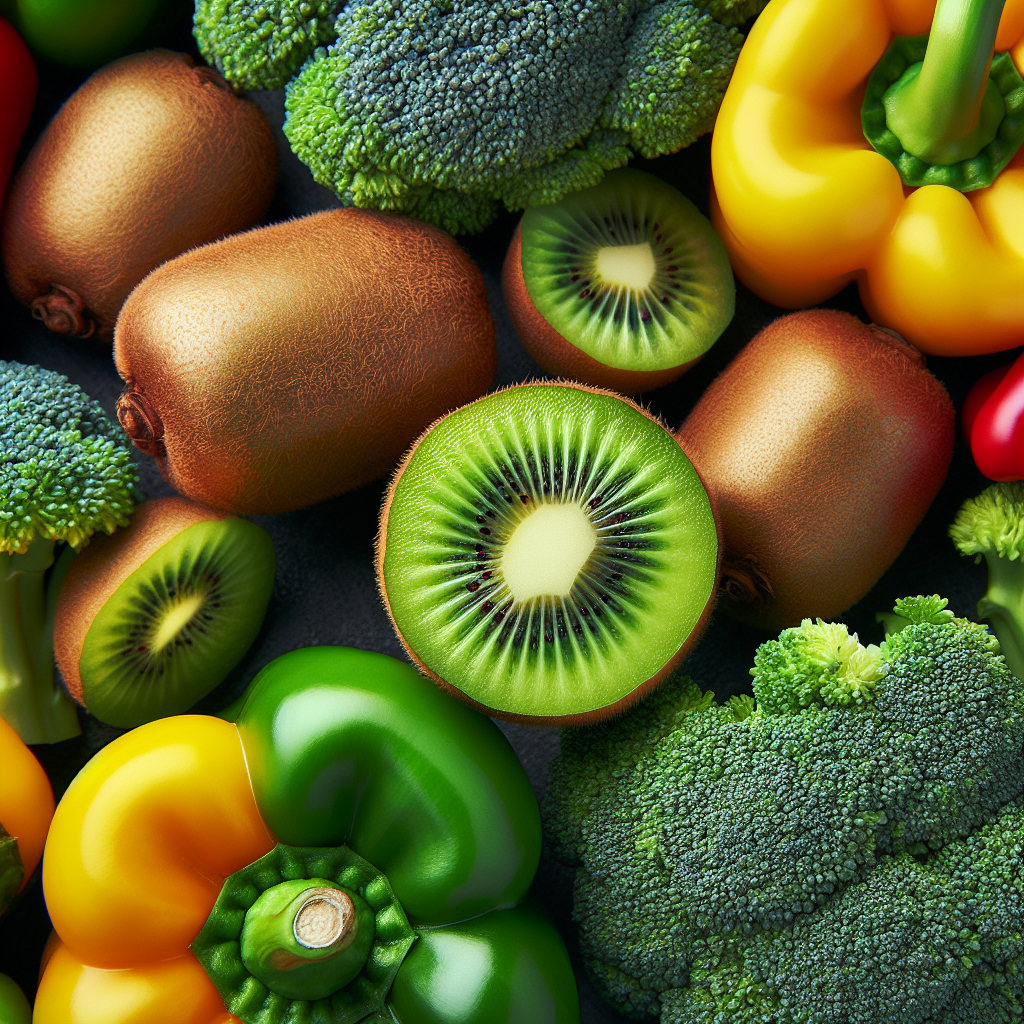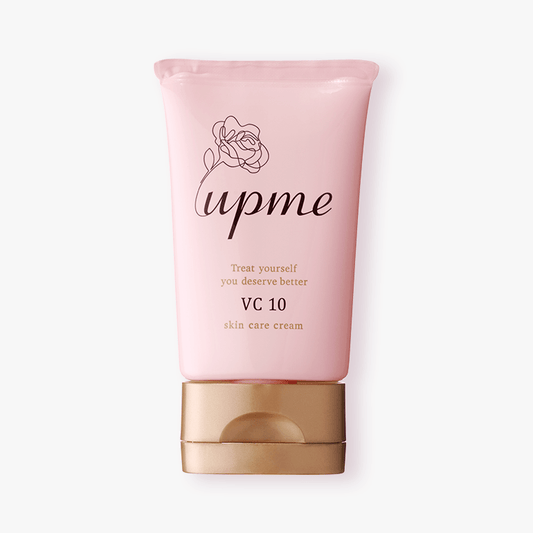
Foods that people with sensitive skin should avoid and how to choose ingredients that are good for your skin
Thank you for visiting our website.
My name is Sato, and I am a staff member at "up me," a Femcare brand cream that contains 10% stable neutral vitamin C derivative, a proprietary product researched and developed by 95 dermatologists.

The theme of this article is "Foods that people with sensitive skin should avoid and how to choose ingredients that are good for the skin."

For people with sensitive skin, skin care is a daily challenge. In fact, one of the major factors that affect the condition of your skin is your diet! In this article, we will introduce in detail the foods that people with sensitive skin should avoid and the points to consider when choosing ingredients that will care for your skin from the inside.
The relationship between sensitive skin and diet
Our skin is made up of what we eat. It is the largest organ of the body and is constantly exposed to stimuli and influences from both inside and outside the body. It uses what we eat as a source of nourishment and extracts the materials it needs to create new cells. Therefore, diet has a direct impact on the health and beauty of our skin.
Foods to avoid
It's important to understand why people with sensitive skin should avoid these foods.
- Processed foods : Additives and preservatives can irritate your skin, and processed foods are generally high in salt, sugar and bad fats, which can lead to skin irritation and acne.
- Alcohol : Alcohol can dry out your skin and aggravate sensitive skin conditions. It can also tax your liver, which can slow down your skin's ability to detoxify.
- Caffeine : Caffeine has a diuretic effect, which can lead to loss of fluid from the body and dry skin. In addition, caffeine itself is a stimulant, so if you have sensitive skin, symptoms such as redness and itching may worsen.
- Dairy : The proteins and hormones in dairy can affect your skin. If you have hormone-sensitive skin or are prone to acne or breakouts, you may want to avoid dairy products.
- Refined Carbohydrates : Refined carbs like white rice, white bread and pastries can spike your blood sugar and cause insulin spikes that lead to skin irritation and acne.

Tips for choosing ingredients that are good for your skin
So what are some foods that people with sensitive skin should actively consume?
- Anti-inflammatory foods : Choose foods that have anti-inflammatory properties to reduce inflammation on your skin. Recommended foods are oily fish like mackerel and salmon, which are rich in omega-3 fatty acids, and healthy fats like olive oil and avocado.
- Foods with antioxidant properties : To prevent skin aging, consume foods with antioxidant properties. Foods rich in vitamins C, E, and polyphenols are recommended. Examples include fruits such as citrus fruits and kiwi, vegetables such as broccoli and peppers, nuts, and seeds.
- Foods that improve your intestinal environment : There is a deep connection between your skin and your intestines, so be sure to consume foods that improve your intestinal environment. We recommend fermented foods and foods that contain prebiotics and probiotics. Fermented foods such as yogurt, kimchi, and miso, foods rich in prebiotics such as bananas and asparagus, and fermented soy foods such as tempeh and miso contain probiotics.
- Foods containing vitamins A, C and E : These vitamins are essential for healthy skin. Vitamin A is found in foods such as carrots, pumpkin and liver, vitamin C in kiwi, broccoli and peppers, and vitamin E in avocados, nuts and seeds.
- Protein-rich foods : In order to produce collagen, the main component of skin, you need to consume enough protein. Recommended foods include fish, meat, eggs, and soy products.

Introducing recommended ingredients
Here we will introduce in more detail the recommended foods for sensitive skin that meet the above points.
- Blue fish
Blue fish such as mackerel and salmon are rich in omega-3 fatty acids, which help reduce skin inflammation. They also contain vitamin E and protein, which help protect and regenerate the skin. Blue fish can be seasoned and cooked in a variety of ways, making it easy to consume.
- Olive oil
Olive oil is rich in omega-3 fatty acids with anti-inflammatory properties and polyphenols with antioxidant properties, making it an ideal food for people with sensitive skin. It can be used in salads, pasta, and other dishes, and is also delicious when spread on bread or baked in the oven with vegetables.
- avocado
Avocados are rich in vitamin E and good fats, which protect and moisturize the skin. They also contain a lot of dietary fiber, which is expected to help regulate the intestinal environment. Avocados are a versatile ingredient that can be sliced and added to salads, spread on toast, or used as a dip.
- Citrus fruits
Citrus fruits, rich in vitamin C, prevent skin aging through their antioxidant properties. Vitamin C also helps produce collagen, which helps maintain skin elasticity and moisture. Try including tangerines, lemons, grapefruits, etc. in your daily diet.
- Yogurt
Yogurt is not only rich in protein and calcium, but it is also a fermented food that contains probiotics. Therefore, it improves intestinal flora and supports skin health from the inside. Try adding your favorite fruits, nuts, honey, etc. to plain yogurt for breakfast or snacks.

Recipes for sensitive skin
Here are some recipes using the ingredients mentioned above that are perfect for people with sensitive skin.
- Mackerel and avocado carpaccio
Ingredients (for 2 people): 100g mackerel (sashimi grade), ½ avocado, ¼ onion, ½ lemon, olive oil, salt, and pepper (a little of each)
How to make: Thinly slice the mackerel and avocado, and thinly slice the onion. Squeeze the lemon and mix with olive oil to make the dressing. Place the mackerel, avocado, and onion on a plate, and pour the dressing over them to finish.
- Sauteed chicken thighs with olive oil
Ingredients (for 2 people): 2 chicken thighs, 1 clove of garlic, 2 sprigs of rosemary, olive oil, salt and pepper (a little of each)
How to make: Season the chicken with salt and pepper, top with garlic and rosemary, drizzle with olive oil, and bake in the oven for 20 minutes. While the meat is resting, discard the excess fat and make a sauce by adding lemon juice to the olive oil remaining in the oven dish. Pour the sauce over the sliced meat and it's done.
- Broccoli and kiwi smoothie
Ingredients (for 1 person): ½ small broccoli, 1 kiwi, ½ banana, 100ml water (or milk)
Directions: Cut the broccoli into small pieces and microwave for 2 minutes. Slice the kiwi and banana. Put all ingredients in a blender and blend until smooth.
- Yogurt bowl
Ingredients (1 serving): 1 cup of yogurt (unsweetened), your favorite fruit (sliced), nuts (coarsely chopped), a little honey
Directions: Place yogurt in a bowl, top with your favorite fruits and nuts, and drizzle with honey.
summary
For people with sensitive skin, it is important to avoid foods that may irritate the skin and choose foods that care for the skin from the inside. Using the tips and recipes introduced in this article as a reference, try incorporating them into your daily meals. Food not only affects your skin, but also your overall health. Eat a balanced diet to achieve beautiful skin and a healthy body!
FAQ
-
What drinks are good for sensitive skin?
Answer: Drinks recommended for people with sensitive skin include green tea and herbal tea. Green tea is rich in catechins, which have antioxidant properties, and there are many types of herbal tea, including those that have skin-calming effects and those with anti-inflammatory properties. -
Is Vitamin C good for sensitive skin?
Answer: Yes! Vitamin C is an antioxidant that helps prevent skin aging. It also helps produce collagen, which helps keep skin elastic and moisturized. Vitamin C is sensitive to heat, so it should be obtained from fruits and vegetables that can be eaten raw. -
How do probiotics help with sensitive skin?
A: Probiotics have the effect of improving the intestinal environment. Since there is a deep connection between the skin and the intestines, taking probiotics can help support skin health from the inside and alleviate the symptoms of sensitive skin. -
What spices should people with sensitive skin avoid?
A: Harsh spices such as curry powder and red chili peppers are not recommended for people with sensitive skin as they can irritate the skin and cause symptoms such as redness, itching and inflammation. -
What is the difference between good and bad fats for the skin?
Answer: Good fats for the skin include omega-3 and monounsaturated fats. These fats have anti-inflammatory properties and help protect and hydrate the skin. Bad fats, on the other hand, include trans and saturated fats. These fats can cause skin inflammation and acne, and can accelerate skin aging.
Finally, remember that the effects of food on your skin vary from person to person.
Please try to follow a diet that is gentle on sensitive skin according to your constitution and lifestyle. Enjoy a peaceful daily life with a balanced diet!

